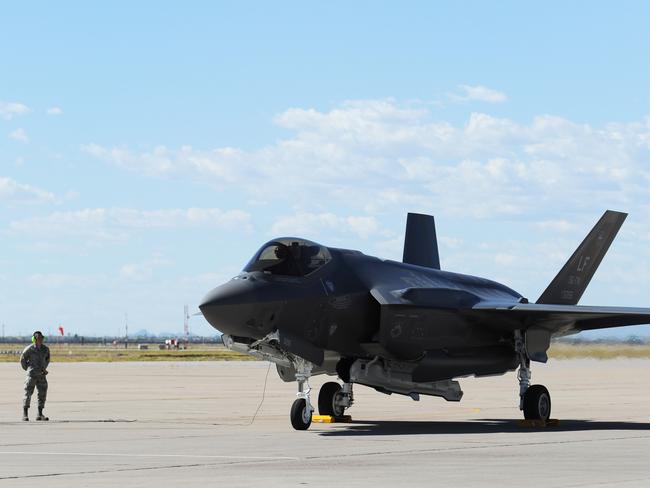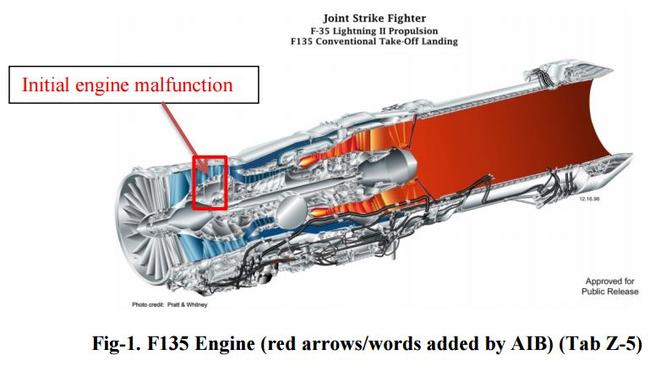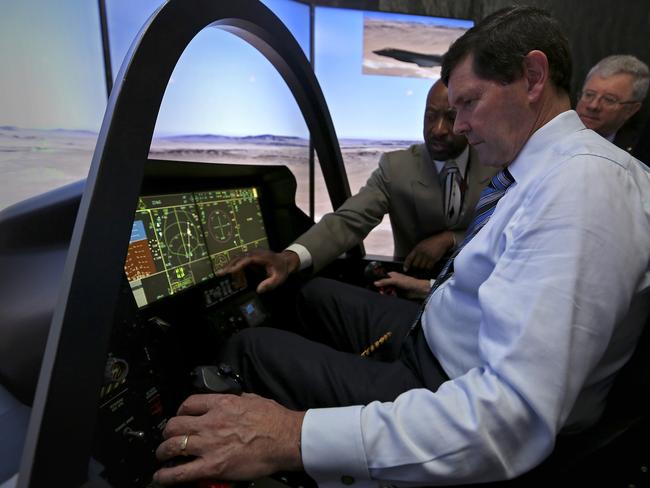F-35 stealth fighter reaches key deadline with ongoing doubts over its capabilities
THE most expensive military project in history must now deliver. After a decade of delays, cost blowouts and a blow-up, the F-35 is going operational — ready or not.
IT’S crunch-time for the most expensive military project in history: After a decade of delays, cost blowouts — and a recent engine blow-up — the F-35 Joint Strike Fighter must now face reality.
The first armed and active squadron of 10 F-35 stealth fighters is scheduled to be handed over to the US Marines on July 10.
It’s been a long and bumpy ride for the project which was initiated as early as 1996 and first flew in 2006. It’s supposed to fill a wide variety of roles currently filled by ageing aircraft such as the F/A-18, A-10, F-16 — and the iconic Harrier ‘jump jet’.
Earlier this month several F-35A Lightning IIs for the first time took part in US war-games.
Locked and Loaded: The #F35 can carry 18,000+ lbs of weapons uncontested: http://t.co/3CrEIpeL87 pic.twitter.com/IDIHIWZytW
— F-35 Lightning II (@thef35) May 7, 2015Operation “Green Flag West” was aimed at exercising pilot dogfighting and ground-attack skills — though the F-35s which took part were forced to operate within strict limitations due to recent structural problems.
“It’s incredibly important that you’ve got to get past just the theoretical ... to get it into the fog and friction of dynamic environment that is changing rapidly,” US Air Combat Command’s General Herbert Carlisle told media during the exercise. It’s a comment equally applicable to the stealth fighter’s “going live” date.
The F-35s currently flying aren’t the real thing. They’re “operationally representative” aircraft. After almost 20 years, they’re still not fully operational.
Even though they’re now supposed to be ready for combat.

SECOND-LINE
The US Marine Corps says it will not be deploying its F-35B (Short Take-off, Vertical Landing) variant of the stealth fighter when they’re handed over next month.
They won’t be joining the fight against Islamic State or the posturing against Russia or China any time soon.
ALREADY OBSOLETE? The F-35 faces an intimidating array of advanced opponents
“If I had my druthers, I’d rather not deploy it right away because I’d like to build some momentum into the program and build the instructor base,” the USMC deputy commandant for aviation, Lieutenant General Jon Davis, recently told military think-tank Janes.
.@USMC has wrapped on #F35 OT-1. See the results by the numbers: http://t.co/GfOtz18THy pic.twitter.com/3OtSHME71u
— F-35 Lightning II (@thef35) June 3, 2015He stated that certification of the aircraft remained incomplete — a prerequisite for meeting the contractual Initial Operational Capability (IOC).
As delivered, the aircraft will be limited to escort, armed reconnaissance and some close air support missions.
This is because production F-35s have not yet been fitted with the non-stealthy wing pylons necessary to carry a significant array of weapons — including a gun pod — and key software hurdles remain for the integration of others.
97.5% of the #F35's 8 million+ lines of required software code are flying: http://t.co/uH0EloZvfa pic.twitter.com/r70FBApy37
— F-35 Lightning II (@thef35) May 5, 2015It also won’t be able to stream video.
The next operational squadron — to be delivered to the US Air Force — is not due to come online until August next year.
Lockheed Martin remains upbeat about the progress of the program, highlighting the aircraft’s stealth and advanced sensor systems as being a major leap forward in combat capability.

VERTICALLY CHALLENGED
There are several key performance and safety issues remaining with the F-35, which is already almost a decade behind its original delivery schedule. These were identified in two US government investigations earlier this year and in a new accident report.
QUESTIONS: F-35 reports identify safety, reliability, combat risks
Chief among them is the sifting and sorting of information gathered by the stealth fighters radars and optical sensors, and reliably displaying that data to the pilot — be it via the advanced virtual-reality helmet or the all-glass cockpit displays. “Workarounds” are reportedly in place to allow pilots to safely fly the combat jet while the “data fusion” problem is being addressed.

There also remain concerns over the F-35’s controversial engine. As a new report reveals, the cause of a “catastrophic” engine fire which did $US50 million damage to an F-35 at Eglin Air Force Base in Florida last year is yet to be fully resolved. The aircraft was set alight by a failed turbine rotor arm which spat turbine blades through the fuselage, severing the fuel and hydraulic systems which are packed tightly around the engine. The cause was reportedly the result of a “relatively aggressive manoeuvre” the combat jet had engaged in during earlier testing. The aircraft is now being stripped for spare parts.

The Marine Corps has also highlighted problems in the aircraft’s on-board digital diagnostics system — the Autonomic Logistics Information System (ALIS). This is supposed to identify an aircraft’s maintenance needs and problems — and report this to service personnel. Aircraft mechanics have reportedly devised another “workaround” using laptops to plug into the aircraft to find out what’s going on. Manufacturer Lockheed Martin says a fix will be available by the end of this year.
As a result of these problems, the entire F-35 fleet has had a suite of flying restrictions placed upon it — including how hard it can turn or climb.

BIG SPEND
Despite the ongoing issues, the Pentagon has asked the US government to hand over $US11 billion for the purchase of 57 F-35s in the next fiscal year and urged further “upfront” commitment from international buyers — arguing that “bulk buys” of the unfinished aircraft will result in savings.
The US Department of Defence earlier this month reported it had seen “progress” in F-35 performance, production schedules and costs.
Pentagon wants large-scale, international #F35 block buy: http://t.co/JJLEGm21VM (via @AirForceTimes) pic.twitter.com/NEY92NXEwv
— F-35 Lightning II (@thef35) May 29, 2015“We are not sitting here worried about the risk of completing baseline development,” undersecretary of defence for acquisition Frank Kendall said. “We’re turning our focus much more toward fielding the program, upgrades in the future and getting whatever efficiencies we can going forward.”
While estimates of the true cost of the Joint Strike Fighter program vary significantly depending on how much research and development costs, maintenance and through-life support are factored in alongside the basic build price — the enormous investment so far has resulted in the delivery of 145 “unfinished” F-35s.

Up to 2443 of the stealth fighters — including the air force “A” variant, the Marine vertical-take-off-and-landing “B” variant, and the naval-adapted “C” model — are expected to be built.
Two of these have been handed over to Australia, but not yet delivered. Any fixes to their ongoing deficiencies will need to be retrospectively fitted.
HYPOTHETICAL: Can Australia put up a fight?
Prime Minister Tony Abbott last year committed Australia to buy 72 F-35A aircraft, though controversy remains over exactly how much of its core stealth and weapons technology the US is willing to export.
And the project’s problems may not yet be behind it.
VIDEO: A look at the #F35 pilot helmet with @LeaFOXNews: http://t.co/536AQCS62Q pic.twitter.com/87Ie6q0HF3
— F-35 Lightning II (@thef35) May 13, 2015The US Department of Defence is already placing emphasis on the need to upgrade the yet-to-be operational aircraft in response to advances in Russian and Chinese technology.
The F-35’s specifications were defined some time ago, Kendell said.
“People develop weapons that they want to have integrated into the platform and technology has matured that we want to insert into the platform … and we want to respond to threat changes, particularly in areas like electronic warfare, and we want to integrate newer weapons that are coming online,” Kendall told US media. “The threat constantly changes out there.”
1st #F35 w/ Australian-made vertical tails rolls out of final finishes facility: http://t.co/FH4WFNGSoJ pic.twitter.com/TGflw1sryJ
— F-35 Lightning II (@thef35) May 12, 2015



